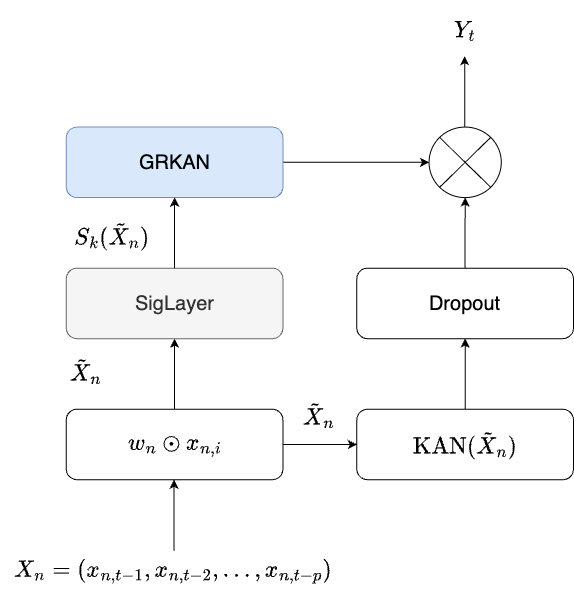This folder includes the original code implemented for the paper of the same name.
A pypi package is available at pypi
The SigKAN is a novel layer that combines the power of path signature and Kolmogorov-Arnold Networks.
The idea behing is to use a learnable path signature that is transformed in weights to the KAN layer.
The Signature is passed through a GRKAN (Gated Residual KAN unit) that is a modified GRN where some Dense layers are replaced by KAN layers.
The signature are computed using iisignature_tensorflow_2 a lightweight wrapper over the iisignature library to create tensorflow 2.x compatible layers for signature function with backward propagation of the gradient.
The code is implemented in tensorflow 2.x and implemnts a custom layer for the SigKAN, that takes an input tensor of shape (baatch_size, time_steps, features) and returns a tensor of shape (batch_size, time_steps, units). The layers can thus be stacked if wanted, however this is not recommended for performances reasons as the iisignature_tensorflow_2 library do not implement GPU acceleration, making made model not XLA compatible.
It is thus important to specify that jit_compile is False in the model.compile() function.
The KAN part implementation has been inspired from efficient_kan and works similarly to it, thus not exactly like the original implementation.
The SigKAN is a keras layers and can be used as any other keras layer, for example:
import tensorflow as tf
from sigkan import SigKAN
model = Sequential([
Input(shape=X_train.shape[1:]),
SigKAN(100, 2, dropout = 0.), # 100 units, signature of order 2, takes an input shape (batch, sequence, features) and returns a tensor of shape (batch, sequence, 100)
Flatten(),
Dense(100, 'relu'),
Dense(units=n_ahead, activation='linear')
])A more complete example is provided in a notebook in the example folder.
The code is provided as is and is not specially maintained.
Please cite our work if you use this repo:
@article{inzirillo2024sigkan,
title={SigKAN: Signature-Weighted Kolmogorov-Arnold Networks for Time Series},
author={Inzirillo, Hugo and Genet, Remi},
journal={arXiv preprint arXiv:2406.17890},
year={2024}
}
This work is licensed under a Creative Commons Attribution-NonCommercial-ShareAlike 4.0 International License.


